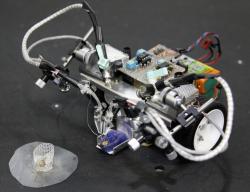Researchers Take Step Toward Creating "Cyborg" Insects for Surveillance

Photo by YOSHIKAZU TSUNO/AFP/Getty Images
Those who are afraid of bugs and those paranoid of government surveillance will be equally uncomfortable with this story.
The New Scientist reports that as part of a program by DARPA, the military research group, scientists from MIT have found a way to control the movements of “cyborg” moths. The necessary gear includes a neural probe attached to the bug’s ventral nerve cord, “a device to generate electrical pulses,” a radio receiver, and a battery—all weighing less than half a gram. The MIT scientists were able to make the “tethered” moth move its abdomen one way or another.
Research into this territory is not new. In 2008 and 2009, Ryohei Kanzaki of Tokyo University's Research Centre for Advanced Science and Technology made headlines for similar work, like a moth-powered robot (seen in the photo accompanying this post).
According to the New Scientist, “DARPA hopes this kind of control will one day allow intelligence agencies to use insects to carry surveillance equipment and spy on unsuspecting enemies.”
But this research could also yield insight to human brains, perhaps even allowing for better care for people who suffer strokes or other brain injuries. Below, a video from the New Scientist breaks down the MIT project.
Read more on the New Scientist.
Future Tense is a partnership of Slate, New America, and Arizona State University.

